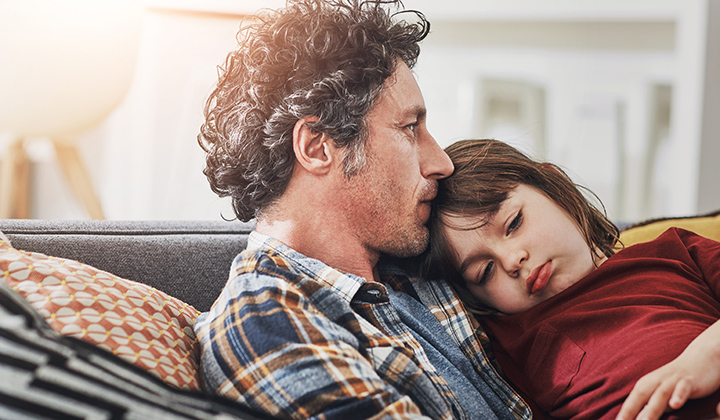Get updates
Subscribe to Parent-ish
Have a parenting hack to share? Or a topic you'd like to see?
September 16, 2024
How to talk with kids about cancer
Contributing Authors:

Cancer is not an easy thing to talk about. It’s understandable why many parents and caregivers feel hesitant to talk with their kids about it. As uncomfortable as it may be, it’s important to be honest with young people about cancer. Talking openly helps relieve anxiety and builds trusting relationships. If someone in your child’s life is diagnosed with cancer, it will affect them. Whether that person is a close family member, a friend, someone at school or in their after-school activities, creating space to talk about cancer is beneficial for your child and for your relationship with them.
Here are 10 things to consider about your discussion:
-
Relieve the pressure to be perfect.
There’s not one right way to talk about cancer with your child. You don’t need to say the perfect words or have all the answers. The most important thing is to let your child know you are there for them and they are safe to come to you with questions and concerns. If you don’t have answers to their questions, tell them you will let them know as soon as you find out. -
Talk as soon as possible and as often as needed.
Kids are intuitive and they will figure out something is going on if someone in their life has cancer. Keep them from creating worst case scenarios in their heads by giving them information as soon as you can. Keep the conversation going over time as you have more information. Let them know they can ask questions as they come up. Be prepared to talk with them throughout the whole cancer journey. -
Acknowledge their emotions.
Your child may be scared, sad or otherwise emotional about someone in their life dealing with cancer. You may be emotional, too. Model for them that it’s healthy for people to feel their feelings. Be a safe space where they can express their emotions and help them deal with whatever feelings they experience. -
Dispel myths.
Cancer is a scary and mysterious thing for most people. For kids, that can put their imagination into overdrive. It is common for children to think cancer is contagious. Another common myth many children believe is that cancer is caused by something they or someone else did. Ease their concerns by assuring them that cancer is not their fault, and they cannot catch it from someone who has it. -
Be honest in an age-appropriate way
It is okay to use the word cancer even when talking with young children. If you know what type of cancer the person has, you can describe to your child where it is in the body. With young kids, you can use a doll or stuffed animal to show where the cancer is. At a basic level, it’s good to share that medical treatment will happen and describe some of the ways that it could affect the person with cancer. Kids are very visual and it’s beneficial to prepare them ahead of time to see physical changes such as hair loss. -
Help them empathize.
If your child has a peer going through cancer treatment, some things may change about their relationship. Maybe the other child will have less energy for active play or less time for play dates because of treatments. Help your child understand the changes and brainstorm with them new ways to honor and maintain the relationship. Remind them that their peer is still the person they know and love, and that they are more than someone dealing with cancer. If your child feels envious of a peer, such as a sibling, getting extra attention or gifts because of cancer, help them understand the difficulties that child is facing. -
Be prepared to talk about death.
Many kids will naturally associate cancer with death. Instead of avoiding the topic, expect it to come up. You can emphasize positives of the present moment like the fact that the person who has cancer is receiving treatment from experts, the person is still here with us now, etc. while also acknowledging that you don’t know what the future holds. Acknowledge and normalize any emotions that come up around the topic of death. -
Keep them connected.
Hospitals and medical settings can be scary and mysterious places for many kids. If your child is close with the person getting cancer treatment, you could try having them video chat or even go with the person to treatment if allowed. Take cues from your child’s personality and the personality of the patient receiving treatment. Some will want to maintain as much closeness as possible, even during treatment. Others may be more comfortable with things like homemade gifts for the person in treatment. -
Maintain balance when possible.
Talking about all aspects of your child’s life is as important as talking with them about cancer. Show interest and ask questions about their activities, relationships, hopes and dreams. Help them keep a routine and stay involved in their usual activities. For kids with high anxiety, it can help to set a regular time to talk about cancer so they know they can talk about it but it doesn’t take over all conversational space. -
Ask for help.
You don’t have to be alone in supporting your child through a loved one’s cancer journey. Call on trusted friends and family, school staff, coaches, community and faith leaders, and healthcare professionals to provide extra encouragement and understanding. You don’t need to have all the answers. Together with other caring adults in your child’s life, you can help them through this difficult time.
Get updates
Subscribe to Parent-ish

